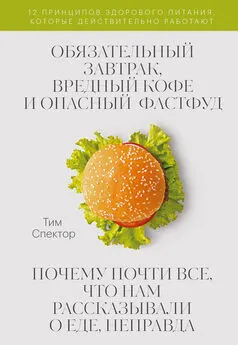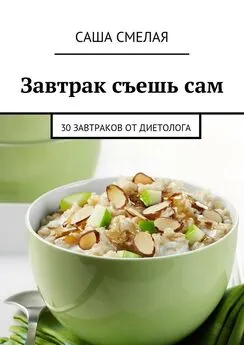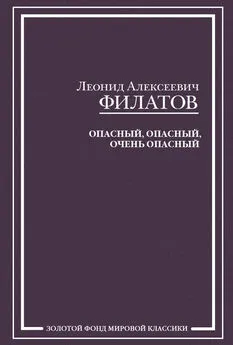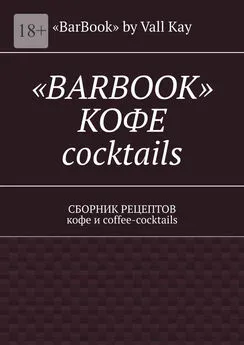Тим Спектор - Обязательный завтрак, вредный кофе и опасный фастфуд
- Название:Обязательный завтрак, вредный кофе и опасный фастфуд
- Автор:
- Жанр:
- Издательство:Манн, Иванов и Фербер
- Год:2021
- Город:Москва
- ISBN:9785001697381
- Рейтинг:
- Избранное:Добавить в избранное
-
Отзывы:
-
Ваша оценка:
Тим Спектор - Обязательный завтрак, вредный кофе и опасный фастфуд краткое содержание
Тим Спектор провел беспрецедентное исследование, в результате которого понял, насколько необоснованны большинство глубоко укорененных в нашем сознании представлений о еде. В каждой главе своей книги он объясняет, почему почти всё, что нам рассказывали о еде, неправда.
Прочитав его книгу, вы сможете полностью переосмыслить свое отношение к еде и научитесь формировать собственный индивидуальный рацион на основе научных рекомендаций.
Обязательный завтрак, вредный кофе и опасный фастфуд - читать онлайн бесплатно ознакомительный отрывок
Интервал:
Закладка:
friendofthesea.org/; fishwise.org/; globalfishingwatch.org
169
Люди, родившиеся в период примерно с 1981 по 1996 год. Прим. науч. ред.
170
Losasso C. Assessing influence of vegan, vegetarian and omnivore oriented Westernized dietary styles on human gut microbiota // Frontiers in Microbiol. 2018. Vol. 9. P. 317.
171
Benatar J. R. Cardiometabolic risk factors in vegans; A meta-analysis of observational studies // PLOS ONE. 2018. Vol. 13. No. 12. P. e0209086.
172
Kahleova H. Cardio-metabolic benefits of plant-based diets // Nutrients. 2017. Vol. 9. No. 8. P. 848.
173
Orlich M. J. Vegetarian dietary patterns and mortality in Adventist Health Study 2 // JAMA Internal Medicine. 2013. Vol. 173. No. 13. Pp. 1230–1238.
174
Fønnebø V. The healthy Seventh-Day Adventist lifestyle: what is the Norwegian experience? // American Journal of Clinical Nutrition. 1994. Vol. 59. No. 5. Pp. 1124S–1129S.
175
Mihrshahi S. Vegetarian diet and all-cause mortality: evidence from a large population-based Australian cohort — the 45 and Up Study // Preventative Medicine. 2017. Vol. 97. Pp. 1–7.
176
Appleby P. N. Mortality in vegetarians and comparable nonvegetarians in the United Kingdom // American Journal of Clinical Nutrition. 2016. Vol. 103. No. 1. Pp. 218–230.
177
Segovia-Siapco G. Health and sustainability outcomes of vegetarian dietary patterns: a revisit of the EPIC-Oxford and the Adventist Health Study 2 cohorts // Eur. J. Clin. Nutr. Jul. 2019. Vol. 72. No. Suppl. 1. Pp. 60–70.
178
Turner-McGrievy G. M. A two-year randomized weight loss trial comparing a vegan diet to a more moderate low-fat diet // Obesity. 2012. Vol. 15. Pp. 2276–2281.
179
Fothergill E. Persistent metabolic adaptation 6 years after “The Biggest Loser” competition // Obesity. 2016. Vol. 24. Pp. 1612–1619.
180
Barthels F. Orthorexic and restrained eating behaviour in vegans, vegetarians, and individuals on a diet // Eat Weight Disord. 2018. Vol. 23. No. 2. Pp. 159–166.
181
Утверждение автора не соответствует действительности. В США, согласно Dietary Guidelines for Americans, рекомендовано употреблять 14 г клетчатки на 1000 ккал энергетической ценности рациона, то есть от 25 г в день, в Великобритании — 30 г в день. В России взрослым рекомендовано употреблять 20 г пищевых волокон в сутки. Прим. науч. ред.
182
Veronese N. Dietary fiber and health outcomes: an umbrella review of systematic reviews and meta-analyses // Am. J. Clin. Nutr. 2018. Vol. 107. No. 3. Pp. 436–444.
183
Billingsley H. E. The antioxidant potential of the Mediterranean diet in patients at high cardiovascular risk: in-depth review of PREDIMED // Nutrition and Diabetes. 2018. Vol. 8. No. 1. P. 13; Subash S. Neuroprotective effects of berry fruits on neurodegenerative diseases // Neural Regeneration Research. 2014. Vol. 9. No. 16. Pp. 1557–1566.
184
Bolland M. J. Calcium intake and risk of fracture: systematic review // BMJ. 2015. Vol. 351. P. h4580.
185
waterfootprint.org/en/resources/waterstat/(November 2019).
186
Whitton C. National Diet and Nutrition Survey: UK food consumption and nutrient intakes // British Journal of Nutrition. 2011. Vol. 106. No. 12. Pp. 1899–1914.
187
Clarys P. Dietary pattern analysis: a comparison between matched vegetarian and omnivorous subjects // Nutrition Journal. 2013. Vol. 12. P. 82.
188
Lynch H. Plant-based diets: considerations for environmental impact, protein quality, and exercise performance // Nutrients. 2018. Vol. 10. No. 12. Pp. 1841.
189
Pawlak R. The prevalence of cobalamin deficiency among vegetarians assessed by serum vitamin B12: a review // European Journal of Clinical Nutrition. 2014. Vol. 68. No. 5. Pp. 541–548.
190
Haider L. M. The effect of vegetarian diets on iron status in adults: a systematic review and meta-analysis // Critical Reviews in Food Science & Nutrition. 2018. Vol. 58. No. 8. Pp. 1359–1374.
191
Saunders T. A. Growth and development of British vegan children // American Journal of Clinical Nutrition. 1988. Vol. 48. No. 3. Pp. 822–825; Sunderland M. Judge convicts parents after baby dies from vegan diet // Vice. 15 June 2017.
192
Webb M. Cost effectiveness of a government supported policy strategy to decrease sodium intake: global analysis across 183 nations // BMJ. 2019. Vol. 356. P. i6699.
193
Trieu K. Salt reduction initiatives around the world — a systematic review of progress towards the global target // PLOS ONE. 2015. Vol. 10. No. 7. P. e0130247.
194
Hidden salt present in popular restaurant meals // BBC News online. 11 March 2013.
195
Moran A. J. Consumer underestimation of sodium in fast food restaurant meals // Appetite. 2017. Vol. 113. Pp. 155–161.
196
Luft K. Influence of genetic variance on sodium sensitivity of blood pressure // Klin. Wochenschr. 1987. Vol. 65. No. 3. Pp. 101–109.
197
Dong O. Excessive dietary sodium intake and elevated blood pressure: a review of current prevention and management strategies and the emerging role of pharmaconutrigenetics // BMJ Nutrition Prevention & Health. 2018. Vol. 1 // doi: 10.1136.
198
Graudal N. A. Effects of low sodium diet versus high sodium diet on blood pressure, renin, aldosterone, catecholamines, cholesterol, and triglyceride // Cochrane Database Syst. Rev. 9 April 2017. Vol. 4. P. CD004022.
199
Adler A. J. Reduced dietary salt for the prevention of cardiovascular disease // Cochrane Database Syst. Rev. 2014. Vol. 12. P. CD009217.
200
Chang H. Y. Effect of potassium-enriched salt on cardiovascular mortality and medical expenses of elderly men // Am. J. Clin. Nutr. 2006. Vol. 83. No. 6. Pp. 1289–1296.
201
Ekinci E. I. Dietary salt intake and mortality in patients with type 2 diabetes // Diabetes Care. 2011. Vol. 34. No. 3. Pp. 703–709.
202
Townsend R. R. Salt intake and insulin sensitivity in healthy human volunteers // Clinical Science. 2007. Vol. 113. No. 3. Pp. 141–148.
203
Mente A. Urinary sodium excretion, blood pressure, cardiovascular disease, and mortality // The Lancet. 2018. Vol. 392. No. 10146. Pp. 496–506.
204
Cappuccio F. P. Population dietary salt reduction and the risk of cardiovascular disease. A scientific statement from the European Salt Action Network // Nutr. Metab. Cardiovasc. Dis. 2018. Vol. 29. No. 2. Pp. 107–114.
205
Лизин — одна из незаменимых аминокислот, в больших количествах содержится в бобовых и в гречневой крупе. Прим. науч. ред.
206
Chiavaroli L. DASH dietary pattern and cardiometabolic outcomes: an umbrella review of systematic reviews and meta-analyses // Nutrients. 2019. Vol. 11. No. 2. P. pii: E338.
207
Scott-Thomas C. Salt replacements could be deadly, say renal specialists // FoodNavigator. 19 March 2009.
208
He K. Consumption of monosodium glutamate in relation to incidence of overweight in Chinese adults: China Health and Nutrition Survey (CHNS) // Am. J. Clin. Nutr. 2011. Vol. 93. No. 6. Pp. 1328–1336.
209
Yang Q. Q. Improved growth performance, food efficiency, and lysine availability in growing rats fed with lysine-biofortified rice // Sci. Rep. 2017. Vol. 7. No. 1. P. 1389.
210
Boston Collaborative Drug Surveillance Program. Coffee drinking and acute myocardial infarction // The Lancet. 1972. Vol. 300. No. 7790. Pp. 1278–1281; Jick H. Coffee and myocardial infarction // New England Journal of Medicine. 1973. Vol. 289. No. 2. Pp. 63–67.
211
Zuchinali P. Effect of caffeine on ventricular arrhythmia: a systematic review and meta-analysis of experimental and clinical studies // EP Europace. 2016. Vol. 18. No. 2. Pp. 257–266.
212
Ding M. Long-term coffee consumption and risk of cardiovascular disease: systematic review and a dose-response meta-analysis // Circulation. 2013. Vol. 129. No. 6. Pp. 643–659.
213
Crippa A. Coffee consumption and mortality from all causes, CVD, and cancer: a dose-response meta-analysis // Am. Journal of Epidemiology. 2014. Vol. 180. No. 8. Pp. 763–775.
214
Parker J. K. Kinetic model for the formation of acrylamide during the finish-frying of commercial French Fries // J. Agricultural and Food Chemistry. 2012. Vol. 60. No. 32. Pp. 9321–9331.
215
Devlin H. How burnt toast and roast potatoes became linked to cancer // The Guardian. 27 January 2017.
216
Marx B. Mécanismes de l’effet diurétique de la caffeine’ // Médecine Sciences. 2016. Vol. 32. No. 5. Pp. 485–490.
217
Liu Q. P. Habitual coffee consumption and risk of cognitive decline/dementia: a systematic review and meta-analysis // Nutrition. 2016. Vol. 32. No. 6. Pp. 628–636; Ross G. W. Association of coffee and caffeine intake with the risk of Parkinson disease // JAMA. 2000. Vol. 283. No. 20. Pp. 2674–2679.
218
Pickering C. Caffeine and exercise: what next? // Sports Medicine. 2019. Vol. 49. No. 7. Pp. 1007–1030.
219
Snel J. Effects of caffeine on sleep and cognition // Progress in Brain Research. 2011. Vol. 190. Pp. 105–117.
220
Winston A. P. Neuropsychiatric effects of caffeine // Advances in Psychiatric Treatment. 2005. Vol. 11. No. 6. Pp. 432–439.
221
Lucas M. Coffee, caffeine, and risk of depression among women // Archives of Internal Medicine. 2011. Vol. 171. No. 17. Pp. 1571–1578.
222
Lucas M. Coffee, caffeine, and risk of completed suicide: results from three prospective cohorts of American adults // World Journal of Biological Psychiatry. 2012. Vol. 15. No. 5. Pp. 377–386.
223
Coelho C. Nature of phenolic compounds in coffee melanoidins // Journal of Agricultural and Food Chemistry. 2014. Vol. 62. No. 31. Pp. 7843–7853.
224
Gniechwitz D. Dietary fiber from coffee beverage: degradation by human fecal microbiota // Journal of Agricultural and Food Chemistry. 2007. Vol. 55. No. 17. Pp. 6989–6996.
Читать дальшеИнтервал:
Закладка:










